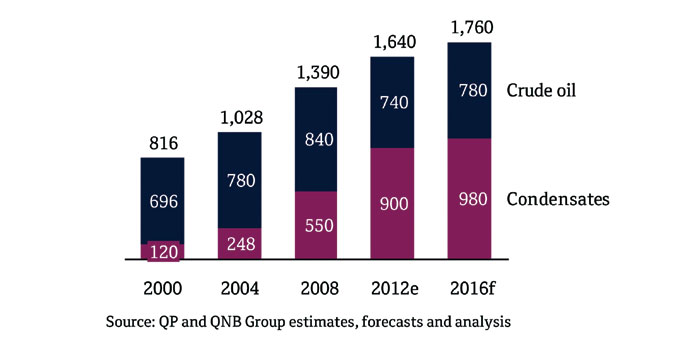|
|
Qatar’s condensate production scaled up to 900,000 barrels per day (bpd) in 2012 on the back of increased extraction of gas through various projects at the North Field, QNB said in its soon-to-be-published Qatar Economic Insight 2013.
The country’s crude oil production was estimated at 740,000bpd in 2012, the report said.
“Condensate output has overtaken crude oil production and is expected to rise further,” QNB said.
Condensate is a very light crude oil, mainly produced as a by product from non associated gas fields.
Qatar’s proven crude oil reserves were estimated by QP (in 2011) at 2.3bn barrels, while condensate reserves have been estimated at 22.3bn.
According to QNB, the country’s oil production will receive a boost from QP’s 2012 decision to convert all production-sharing agreements (PSAs) with foreign partners into joint ventures.
“QP will directly invest in projects as crude oil production has been declining in some of the major oil fields in recent years. QP is also looking at increasing reserves/production and sustaining current reservoirs through enhanced oil recovery techniques.
“This is expected to increase reserves by an additional 1bn barrels and production by 40,000 bpd by 2016, while slowing the decline from mature fields. Condensate production is also set to rise by about 80,000 bpd by 2016 as a result of higher gas production.”
Sovereign credit: Qatar has the highest credit ratings in the GCC, along with Kuwait, QNB said. The country’s ratings also “compare favourably” with some of the most advanced economies in the world.
Qatar’s long-term foreign currency rating from Moody’s is currently at Aa2 and from Standard and Poor’s is at AA. The outlook on the ratings is stable.
Qatar’s ratings are supported by the country’s robust economic fundamentals and strong government finances.
Government spending is now focused on achieving Qatar’s 2030 vision, QNB said. Qatar’s long term growth plans were outlined in October 2008, through the Qatar National Vision 2030.
It is based on four fundamental principles of sustainable economic, social, environmental and human capital development.
These aims are set to be achieved though a series of medium-term strategic plans. The first National Development Strategy covers the period 2011-16 (NDS 2011-16) and sets a baseline scenario from 2011-16. Page 40
Inflation ‘set to rise to 3.5% this year’
Increasing demand for housing, triggered by population growth, will see a pick up in Qatar’s inflation to 3.5% this year and 3.8% in 2014, QNB has said. Consumer price index (CPI) inflation in Qatar increased by an annual average of 1.9% in 2012. Inflation in Qatar has remained subdued in 2011-12 mainly due to declining rent prices. However, rents stabilised in the first half of 2012 and started to rise in the second half.
“We forecast inflation to increase in 2013 to 3.5%, driven by a continuing increase in rent prices, and to 3.8% in 2014 as increased project activity will see an inflow of workers, putting further pressures on housing supply and prices,” QNB said.
Non-rent inflation is expected to remain steady at around 3% as international food prices stabilise and owing to the demand dampening effects of an economy that has slowed from double-digit growth.

